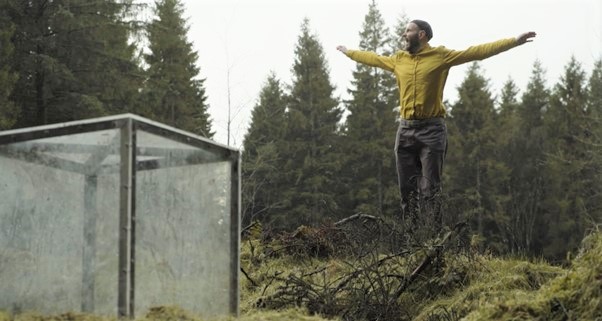
Mechanimal are an award-winning company that makes international touring live performance. Senior Producer Michael Sells, spoke to Tom Bailey (pictured) who has been on a residency here at Dartington as part of a collaboration between Dartington Arts and The Movement Mind and Ecology Masters.
Q: Who or what is Mechanimal?
A: Mechanimal was started by me, it’s a collective of humans, non-humans, machines and Nature somehow connecting and creating work that explores what is going on the world right now, it makes shows, encounters, experiences that explore our changing planet.
I find that each project I make is inspired by the Southwest landscape where I’m from, I spend a lot of time rehearsing, exploring outdoors and then bringing those influences from the outdoors indoors. That’s a critical part of my process which is why it’s been really cool, to be here at Dartington and find ways of bringing inspiration with the landscape into making the work. I made a piece about bird migration I spent lot of time rehearsing being a bird on the Somerset Levels in a bird wetland being a marsh warbler then going and finding lots of bones and emptiness in Dartmoor for a piece about species extinction which is still very much present and when I made the mining piece (Megalith) I was looking at the Neolithic origins of mining which were around copper and then finding lots of beauty in this very Neolithic landscape that we live in – the highest concentration of it is in the South west, we are in this sacred landscape, it’s everywhere.
Q: What have you been working on while you’ve been on a residency here at Dartington?
A: I’ve been working on a redevelopment of a piece I made about species extinction looking at the RUCN red list, it’s more like a sequel. Essentially since the pandemic the list of extinct species the original piece (Vigil) was based on has doubled in size in just 5 years so rather than re-tour the old show, we wanted to make a new show in the context of what’s changed. I also wanted to see if Covid has changed the way we view species and the role of how technology might be mediating the human-nature relationship. Something hot on the radar at the moment is AI and if are we going from a situation of decreased bio-diversity towards increased machine diversity – big questions like that we are grappling with this week – the other is a more personal intimate piece, I’m exploring how the treatment of disease in humans parallels with climate change and our starting place for this is a rehearsal of Hamlet.
Q: What role do you think culture has to play in the climate emergency?
A: Culture has a massive role I think it is such a broad-church. Culture inspires stories and change and a change of perspective on a widespread scale. The classic thing you hear in the science community is “we need artists to tell stories, stories are the things that inspire change rather than data”. I’m always on the fence with my own work and being realistic about the change I can expect to make. The stuff I do is trying to dig underneath all the questions about climate change and Anthropocene. I can offer a space for mediation that is say, completely different from a David Attenborough documentary or a Government paper on climate change, I think it’s trying to create a third space where we can really offer heart space for meditation on some of the deeper changes that are needed, I don’t expect audiences to go away drum-banging , I try to offer new ways of seeing, new ways out of the difficulties we are in. That communal, ritual element is why I do theatre. A film or a protest could reach more people, but it’s a question for me about not just bringing humans together but bringing humans and non-humans together and really questioning the traditional human centricity of theatre in the Anthropocene. It is decentring the human is what I’m trying to do with working with all these landscapes and trees.
What shows haven’t you made yet that you would like to make?
I would love to co-create a show with a tree on completely equal terms and explore what that is. More and more I’m interested in working organically with things but also looking at the technological mediation of the human/nature relationships and how machines might be part of the solution and not just part of a dark problem. I work with creative technology looking at sound and visualisation of the natural world. I’m keen on making installations that might invite us to think about being species within the installation. I’ve just started an investigation with a series of organisation across Europe looking at how the war with Russian and Ukraine has affected different arts communities in different parts of Europe. It seems like a war that has come up with its own innovations like drone use and that war has become a mediated experience and what is legitimate to what?
You can see more of the work Tom has created as Mechanimal at Mechanical | About
If you would like chance to explore the natural landscape of Dartington, why not join the Dartington Arts Experience?
